#Princess Urduja
Explore tagged Tumblr posts
Text

Prinsesa Urduja, the legendary warrior princess who ruled the Tawalisi Kingdom, located in Pangasinan, Philippines.
Cesar Amorsolo's Warrior Princess. Circa 1956.
#art#painting#filipino art#filipina#warrior princess#philippines#contemporary philippine art#urduja#amorsolo#babaylan#filipiniana#artph#philippine art
1K notes
·
View notes
Text
In the philippines, the Moroccan traveller Ibn Battuta was well loved bc one of the princesses he mentioned in his stories, Princess Urduja, the warrior, was thought to be from the Philippine mandala of Pangasinan. His travels are something that always fascinated me- it was nice reading about the medieval world outside of Europe, from the eyes of someone who was an Islamic scholar- far removed from the European world.
Thinking about how during the black plague was one of the worst times to be Jewish in Europe, because, oh well, everytime a calamity in Europe happens, Jews were always the first to become the scapegoats.. but when Ibn Battuta travelled to Syria, where the black plague had spread as well, all he saw were Christians, Muslims and Jews praying together, parading in the streets holding up copies of the torah, the quran and the bible- Europeans viewed the bubonic plague as something they needed to atone for- so they ended up massacring their Jewish populations, but in places like Damascus, it was seen as something one must withstand, or one of G-d's Unknowable ways- No one needed to "pay"- community must endure. I don't know! This is just something I think about a lot.
300 notes
·
View notes
Photo

Urduja designed by Bella Filipina Designs.
On its 8th year anniversary, Bella Filipina Cross Stitch Designs is proud to present its 50th design -
URDUJA BF 050
“She appears like a light in the darkest of nights. Her golden tail and amber scales radiate like the sun. Bare of the battle armor, she is clad with nothing but ropes of the rare South Sea pearls, and glowing against her bronze skin, golden treasures befitting a royalty. A tribute to the legendary warrior princess Urduja, she is an embodiment of strength and power like the Amazons of old. Her name, Sanskrit for rising sun, is synonymous with golden light and victories. Her beauty, a celebration of women and their diversity.”
Stitch Count: 157x293 Stitches
Taking inspiration from the pre-colonial Philippines, when gold was abundant and part of our ancestors’ everyday lives, this golden release is a celebration of what Bella Filipina is all about - our rich heritage, our different cultures, and the diverse beauty, not only of Filipinas, but of women around the world.
Recommended Fabric Color: "Midnight Splendor" by Fiberlicious Yummy Fibers
6 notes
·
View notes
Text



Urduja is a very important character within my Radu storyline. During Radu's quest, Vashti advises her son to come see Urduja, the warrior princess as she could help him in his journey. In Universe, mortals can ascend to godhood if a god deems them worthy of the title, she was one of them.
I was fucking around with her colors to see what sticks and I think I like her better with darker skin. Gods like her can switch back to their mortal selves if they wish but she doesn't do that because she deems her new form as a sign of pride and accomplishments. Also Radu and Urduja end up together hehe. This is the only ship dynamic 👌
#iamthe-walnut original art#original character#original characters#oc#artists on tumblr#them#Urduja is based from a character in Philippine legends with the same name
9 notes
·
View notes
Text
girl help! every day I get the urge to design Filipino Servants for FGO but the only design I have for them is very generic and plays hard on the "what survived of them from historical accounts", resulting to some of them manifesting in Classes contradicting their personality (e.g. Saber Rizal but has Caster skills, Assassin Goyo but has Rider attack power and skills), and some of them manifesting because of popular depiction (e.g. Caster Mabini, Ruler Bonifacio, Berserker Luna)
(mostly Servants from the Spanish Revolution. I can throw in some Servants during the American occupation and no further. Anyone beyond that point can get testy. Sorting through historians through their political bias is stressful work already when researching the Spanish Revolution period.)
There are mythological pre-colonial figures as well such as Lapu-Lapu (who killed Ferdinand Magellan), Princess Urduja, Queen Amaya (whose twin sister is a snake), Lam-Ang, and the Bakunawa story. Modern myths are very Komiks based such as Darna, Pedro Penduco, Panday, Varga, and Palos (i only the fantasy ones orz)
2 notes
·
View notes
Text
URDUJA // PRINCESS OF KAYLUKARI
“She was a legendary warrior princess recorded in the travel accounts of Ibn Battuta (1304 – possibly 1368 or 1377 AD). Her army was composed of men and women. Urduja was a woman warrior who personally took part in the fighting and engaged in duels with other warriors. She was quoted as saying that she will marry no one but him who defeats her in duel. Other warriors avoided fighting her for fear of being disgraced. Urduja impressed Ibn Battuta with her military exploits and her ambition to lead an expedition to India, known to her as the "Pepper Country." She also showed her hospitality by preparing a banquet for Ibn Battuta and the crew of his ship. Urduja generously provided Ibn Battuta with gifts that included robes, rice, two buffaloes, and four large jars of ginger, pepper, lemons, and mangoes, all salted, in preparation for Ibn Battuta's sea-voyage to China.”


0 notes
Text
So I am changing Angel Rogue into a Princess Urduja story…so I guess it will be set here in the Philippines.
0 notes
Text


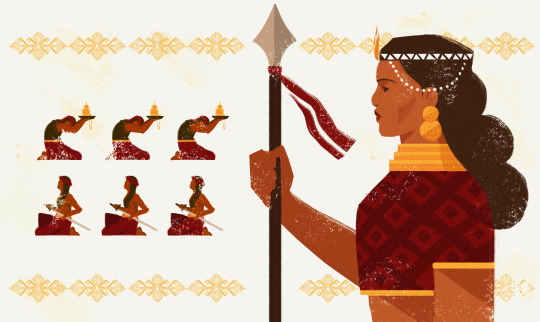
Princess Urduja
Urduja (ca. 1350–1400 AD) is a legendary warrior princess who ruled the kingdom of Tawilisi, speculated to be Pangasinan, Philippines in the present day. Urduja was the leader of the Kinalakihan, the women warriors of her kingdom, and personally engaged in battles with other warriors. She was quoted as saying that she will not marry a man who cannot defeat her in wit and battle and thus was never wed.
#artists on tumblr#filipino#woc#Princess Urduja#philippine mythology#fake syle frame moods this week#the baybayin is deliberately the un-modernized one hence why the 'r' is missing and it reads as 'uduha'/'odoha'
2K notes
·
View notes
Note
49,55,90, and 95!
49. what saying or quote do you live by?
“I believe that man will not merely endure: he will prevail. He is immortal, not because he alone among creatures has an inexhaustible voice, but because he has a soul, a spirit capable of compassion and sacrifice and endurance. The poet's, the writer's, duty is to write about these things. It is his privilege to help a man endure by lifting his heart, by reminding him of the courage and honor and hope and pride and compassion and pity and sacrifice which have been the glory of his past.” - William Faulkner
55. favorite fairy tale?
Does Princess Urduja count?
90. luckiest mistake?
Okay so I know I talk about the @broturi a lot but they’ve really impacted my life. So I join a lot of the twilight tumblr group chats but the notification feature is so bad I never remember to check so I never speak in them. One day for no apparent reason I ended up talking in one of them. I don’t even know why it was pure coincidence. And I got a long really well with some of them and they talked about a discord they made and I was like “oh I’m an english major it’s finals and I have a lot of essays due so I can’t join a discord but my finals are done in a couple days I’ll join then” and I think it was the very next day or the day after when I was taking a break so I checked the group chat and I saw everyone leaving it. I got curious and asked why. I won’t get into what happened (if you know you know) but they sent me a link to the new discord and that ended up being the broturi. I don’t know what made me speak in the group chat that day but oh my god I’m beyond thankful that I did. I would’ve missed out on meeting some pretty amazing people if I didn’t. So not really a mistake but definitely an accident. (Sorry I couldn’t think of a mistake)
95. favorite app on your phone?
Don’t @ me but the entire Star Wars knights of the old republic game is in the App Store and I spend more time than I want to admit playing it
6 notes
·
View notes
Text
Homework was make a comic book cover HENCE my interpretation of Princess Urduja!!

#art#watercolour#myart#illustration#Princess Urduja#mmmyes tumblr tagging system is so mucj better than twitter#comic#komik
22 notes
·
View notes
Text
https://www.instagram.com/p/CZOILRYL0o5/?utm_medium=copy_link
instagram
1 note
·
View note
Text

Made some progress on my Urduja/Bakunawa leg sleeve. This is definetly the most challenging tattoo I’ve gotten so far, but I’m excited! Slowly but surely chipping away; adding a sampaguita next! Got a few more sessions left…
0 notes
Text
The Warrior Princess: Princess Urduja

I think you guys should know about this Filipino princess right now…
So, I asked my dad if Philippines ever had a monarch, and he told me about a princess — Princess Urduja — who ruled a Philippine province known today as Pangasinan (known, back then, as “Tawalisi”) around the 14th century.
According to some research sources, she was “young, beautiful, and well-educated.” But she was far more than that; she was also a warrior. She trained in the arts of war as a child, and also personally led her army into battle, typically on horseback. (And, as my dad added: “Her brother failed at fighting in battle, so she took his place.”)
BUT HERE’S WHERE IT GETS BETTER!
Her ‘army’ consisted of other warrior women who were “skilled in arms, in riding horses” and had “well-built and well-developed bodies, prodigious strength, and ‘masculine’ physique.” (Because she believed that females could fight just as well as males.) They were called Kinalakian or Amazon.
-
(Sound familiar? Hint: Where have you heard the term Amazonians? This Princess is literally starting to sound like Wonder Woman… but that’s just me…)
-
ANYWAYS, HERE’S THE BEST PART!
She. Did. Not. Have. A. Love. Interest.
Suitors came from all around, but she would not allow anyone to have her hand unless they beat her in a duel.
A duel. And no one ever did.
She supposedly said to a traveller once: “And you have heard, too, I’m sure, that I am still unmarried because I will marry no man except him who shall conquer me, and all the eligible suitors in this vicinity are afraid to try for fear of being beaten by a girl.”
She wanted her husband to be “braver, stronger, and wiser than [her]” — but nobody qualified, thus she remained unmarried throughout her life.
(And at this point, I’ve fallen in love.)
However, historians speculate that Princess Urduja is actually a hoax.
This may be because there is only one account recorded of her: It was from a Moroccan traveller, Ibn Battuta, who’d supposedly stopped by Tawalisi on his voyage to China and wrote about his encounter with Princess Urduja.
They claimed that Battuta’s “encounter” with this warrior Princess had been fake — made-up — and that she was simply a made-up story, as well.
Despite their doubt, many Filipinos regard Princess Urduja more of a “myth” and “legend” rather than a fairytale ((connotation matters)); and some people — especially the Pangasinenses — even persist that she was real.
I believe she was. (Do you?)
#Princess Urduja#Philippines#feminism#badass female#love her#wonder woman#warrior#warrior princess#myth#legend#idol#goddess
6 notes
·
View notes
Photo
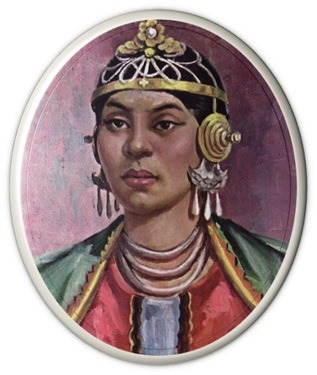
Princess Urduja
Warrior Queen of Pangasinan
A warrior queen of a matriarchal dynasty, Urduja was a 14th century ruler of Tawalisi, in what is now known as Pangasinan.
Princess Urduja was trained in the art of war since she was a child and became an expert in kampilan and a skilled navigator. Known far and wide, she was famous for leading a retinue of women warriors who were skilled fighters, equestrians and experts in weaponry. With bodies of strength and muscular physique, they were known as Kinalakian, or Amazons.
To the Pangasinan court many a suitor came, seeking the hand of fair Urduja. The Princess said to them, "I will marry only the man who can defeat me. My husband must be braver, stronger, and wiser than myself." As no one qualified to her demands, she remained unmarried all her life. When her mother died, she became the ruler of Pangasinan region. Her bravery and skills were known far and near. She ruled her people well and wisely. Like the famous Amazons of the old, Princess Urduja was not only intelligent, beautiful, and dominant, but also the very personification of kindness and virtue. One of her policies was to introduce the best of other countries, and adapted them to her own. She was a woman who was interested in foreign affairs for the good of her own kingdom. She liked to hear tales about India, the Pepper Country.
The legend of Princess Urduja can be attributed to the story of when she met the greatest traveler in history, Ibn Battuta.
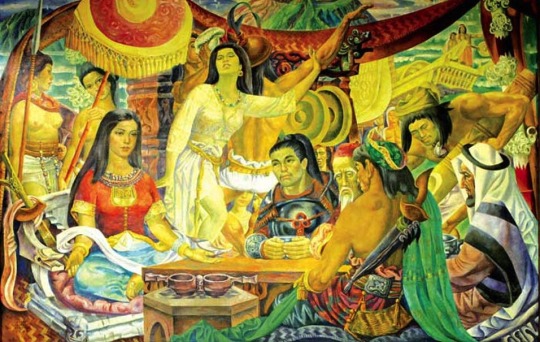
In 1347, Ibn Battuta was a passenger on a Chinese junk, which had just come from the port of Kakula, north of Java and Sumatra, and passed by Pangasinan on the way to Canton, China.
According to her custom, Princess Urduja invited the ship's crew to a banquet. The Arab refused to go because he could not eat their food since they were "infidels.” The princess was offended and summoned him. He was surprised at what his eyes witnessed and his ears heard. For the Princess was robed in her richest and best, decked with precious stones and surrounded by brave and loyal men and women. She talked to the visitor in Arabic. This alone proved that she was a Muslim, knew her Qur’an, and in Arabic, she told him:
"You, Priest, I have had you brought here by my guards because, of all of your ship's company, you alone scorned my invitation. You told your Captain that we, people of Northern Luzon are infidels, and that it would be against the Prophet’s law for you, a holy man, to eat our food.
"You behold about me, seated around my throne, the elderly ladies who are my counselors. Do their chairs of sandalwood, does my silk-canopied and gold-plated throne, suggest the court of a barbarous people?”
"I greeted you with the usual salutations of courtesy in the Arabic tongue, and had one of my attendants fetch ink and paper so I could write for you [Bismillah ar-Rahman ar-Raheem] in Arabic characters that you recognized as the name of The Merciful and Compassionate God. Are such tokens of culture common among barbarians?
“When my father Dalisay, the aged king by whose name you call his kingdom, was a much younger man, there visited here a priest of another faith from far distant Europe. But he did not shun novelty in food as you do. The sago trees that produce flour, interest him, he admired the sugar-giving buri palms, and liked our coconut wine. And I hope you will appreciate the cordial pickles and preserves which, with some other gifts for your acceptance in remembrance of the land of Dalisay, I have had sent to your ship.
“But let us no more speak of our mistaken notions of us. We pride ourselves upon our hospitality, and you, a holy man though you are, need have no compunction of conscience in eating the food set before you.
“You have been told all about me. You know that I am governor of this port in place of my brother because, with my army of free women, slave girls and female captives —all of whom fought just as well as men could—I won a big battle. And you have heard, too, I'm sure, that I am still unmarried because I will marry no man except him who shall conquer me, and all the eligible suitors in this vicinity are afraid to try for fear of being beaten by a girl.
“Now tell me of great India, which we know as the Pepper Country. I want to hear all about it. The little I know has fascinated me. Would there be any chance, If I should go to war with India, of my getting? Its great wealth and great forces attract me.” And the Arab replied, “Do so.”
Princess Urduja told him of her many expeditions, sending him on his journey with robes, two elephant loads of rice, two buffalos, ten ships, and four martabans (large jars) filled with ginger, pepper, lemons, and mangoes, all of them salted, these being among the things prepared for sea voyages.
__________________________________________________
Urduja's name still has great resonance among the Ibaloi, one of the major ethnolinguistic tribes in the Cordillera region. Dr. Morr Tadeo Pungayan, a respected scholar of Ibaloi culture and professor at the St. Louis University of Baguio City said, "Linguistically, Urduja is Deboxah (pronounced Debuca) in Ibaloi. We've always had a woman named Deboxah from time immemorial among the genrations of Ibaloi. The name usually describes a woman of strong quality and character who's nobly descended. That name is an Ibaloi name. That's why Ibaloi trace their ancestry from Urduja."
The Cordillera tribes, also known collectively as Igorots, pride themselves as being the only ethnic group that doesn't talk about the origin of man according to Spanish chronicles. Among the tribes, genealogy and family history are orally passed history. The Ibaloi, just like other highland tribes, could easily trace their ancestry. This is ensured by their custom of naming newborns after ancestors to help keep their memory alive and evoke affection and protection.
"No Ibaloi will bear the name of an ancestor unless she's related," Dr. Pungayan explained. While the Bontoc tribe bestows the name of an ancestor to a grandchild, the Ibaloi style is namesaking the great-grandchild, he added.
A book on the history of Benguet province, written by Anavic Bagamasbad and Zenaida Hamada-Pawid, shows the Benguet genealogy tracing tribal family lines from the year 1380 to 1899. The book says,
"The extent of inter-settlement alliances is climaxed in the memory of Tublay informants with the reign of Deboxah, Princess Urduja, in Pinga.
She's acknowledged as the granddaughter of Udayan, an outstanding warrior of Darew. Her death signaled continuous decline of kinship and alliance between highland and lowland settlements."
The Darew mountain range is remembered as the earliest settlement in the mining town of Tublay. The close relations between the Cordilleras and Lingayen are well-accounted for in Battuta's chronicle. It said that the Kingdom of Tawalisi was very extensive, including the vast areas up to the fringes of the Benguet mountains and the Cordillera ranges in the east of Luzon.
References:
Galang, Encyclopedia of Philippines, p. 179-181.
Del Castillo y Tuazon, Antonio, "Princess Urduja : amazon ruler of the Amazon Dynastic Kingdom of Tawalisi or Talamasin, Pangasinan-Caboloan."
The Researcher, Vol. II, No. 2, November 1969, p. 133-168.
Guiterrez, C, Filipinas Magazine, June l999.
http://snml.weebly.com/princess-urduja.html
#Princess Urduja#Pinay Warrior#womenwarriors#matriarchy#indigenous#Queen#QueenWarrior#Filipina#bladeculture#Filipina Fighting Arts#Filipino Fighting Arts#SurvivalArts#knifelife#Pilipinas#Philippines#truehistory#herstory#sheros#womyn#pinay#pinoy#IbnBattuta#travelingtales#precolonial philippines#Filipino#Arabic#Urduja#MuslimQueen#wmnspiration#oralhistory
6 notes
·
View notes
Photo
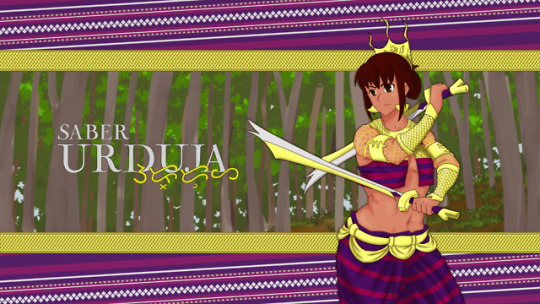
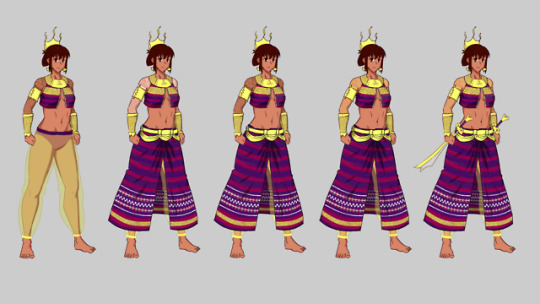
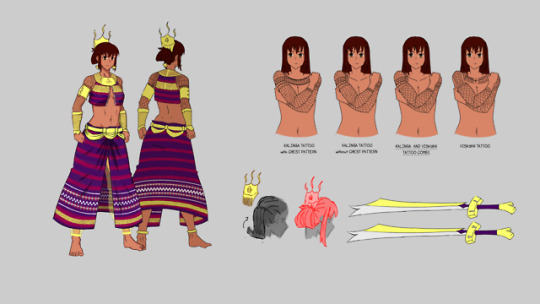
SABER ORCHID
This is fan concept art of the servant I created for Fate Universe.
The real name of the servant is Urduja. According to the legend, she was Warrior Princess which reside in the Pangasinan, Philippines. I selected her to be a Saber class which I think is befitting for her character.
8 notes
·
View notes
